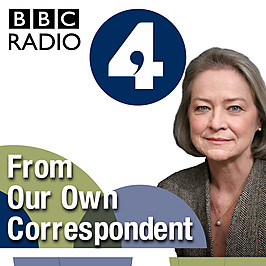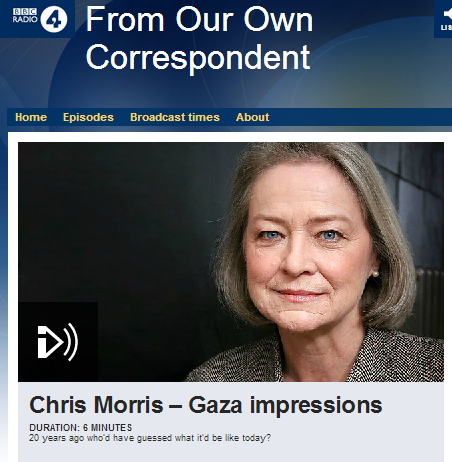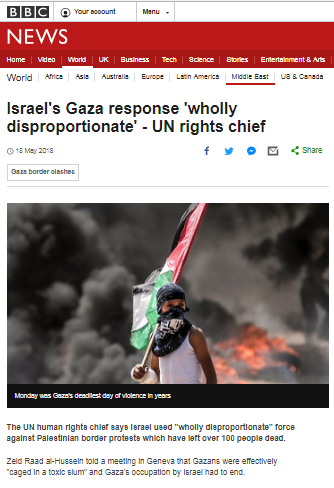Readers no doubt remember that on July 5th – three days before Operation Protective Edge commenced – the BBC’s World Editor Andrew Roy appeared on the World Service’s ‘Outside Source’ programme to explain how the BBC ensures equal coverage of what the programme termed “Israel-Palestine”.
Andrew Roy: “Well we try to look at the entirety of our coverage. We’re not minute counting. We are ensuring that across the whole thing we can look back on our coverage of this and say we did give fair balance to each side. So it’s not a minute by minute thing, no.” […]
Presenter: “When you get people complaining that they feel one side has been given more air-time or more favour than the other, what do you do?”
Andrew Roy: “We answer them by giving them the evidence that we’ve tried to put the other side as often as we can.”
Let’s take a look at the accuracy and validity of Roy’s claims by using a test case: BBC Radio 4’s ‘From Our Own Correspondent’.
Between July 8th (commencement of Operation Protective Edge) and the present, eight editions of the programme have been broadcast. The first two (July 10th and July 12th) did not include any content related to the conflict in Israel and the Gaza Strip.
The July 17th edition included an item by Yolande Knell (available here from 00:42) which was introduced by presenter Kate Adie using the description ‘fasting under fire’. Knell’s report focuses entirely on the presentation of life in the Gaza Strip with descriptions of shortages of food, frightened children, reduced business in markets and evacuees. Much focus is also put on the topic of border restrictions with Knell twice quoting interviewees referring to a “siege” which of course does not exist and no explanation given regarding the terrorism which brought about the border restrictions.
On July 19th the programme featured an item by Jeremy Bowen which is available here from 00:45. Whilst the item is introduced as being about the whole Middle East, the BBC’s Middle East editor has his sights firmly set on one tiny part of that region. Using the language of Hamas Bowen tells listeners:
“Gaza’s economy is definitely not able to support a population of 1.7 million people but that’s because of the siege imposed by Israel and Egypt.” [emphasis added]
Like Knell before him, Bowen makes no attempt to tell listeners about the Hamas terrorism which brought about border restrictions. He later continues:
“And there’s been a reminder in the last few days of the terrible potency of the conflict between Israel and the Palestinians. [..] But the new war in Gaza shows how the Palestinian –Israeli conflict still has resonance across the world as well as in the region. People care about it, get angry about it in a way that they don’t about other crises and wars. I’m calling what’s happening in Gaza a war though I’m aware that it perhaps is not a perfect description. Some people have even told me I shouldn’t use the word because of the enormous imbalance of power between Israel and the Palestinians. I disagree. Wars are increasingly fought between the strong and the weak. By the way, it’s wrong to pretend that there’s any kind of equality between what Israeli citizens are going through and the experience of Palestinians. The trauma of Israelis caught up in mass attacks is unquestionable but the trauma in Gaza is of an utterly different degree. The only long-term way to end this chronic killing is through a permanent settlement of the dispute between Israel and the Palestinians. It has to be one both sides can tolerate. An imposed peace would just contain the seeds of the next war. But at the moment peace is not conceivable. Even a long-term absence of war is unattainable. What’s the alternative? If nothing changes more and more of these mini wars, which will eventually become major wars.” [emphasis added]
The BBC’s Middle East editor makes no effort to inform listeners that Hamas is not interested in the kind of “permanent settlement” which has been on the table for two decades, neglecting to inform them that Hamas was one of the Palestinian factions which rejected the Oslo accords.
On July 26th listeners to ‘From Our Own Correspondent’ heard Paul Adams. That item is available from 00:50 here and includes the following. [all emphasis in bold added]
“Generations have experienced nothing but occupation, embargo, blockade, war and death. It’s had a slow, brutalising effect. Perhaps that’s why some of them are seized by such a furious desire to tunnel out and seek revenge. For Gaza is a giant prison surrounded by a wall, watch towers and the most sophisticated military in the Middle East.”
Although he makes no effort to inform listeners of the fact that nine years ago, when Israel withdrew, Gaza stood at a crossroads which could have taken it in a very different direction had its leaders not chosen terrorism as their raison d’être, notably Adams does tell of things which – like the rest of his colleagues – he failed to report whilst he was in Gaza.
“Of course it would be wrong to suggest that this prison 66 years in the making is full only of the innocent. There are men of violence here. Men who will never, ever accept Israel’s right to exist in the land they still regard as theirs. Men who will store weapons in mosques and schools and take great pride in launching almost entirely indiscriminate rockets from the midst of populated areas, hoping – in the name of resistance – to cause death and fear on the other side. During a week in Gaza I caught occasional glimpses of them; weapons stuffed under shirts, furtive in civilian clothes, moving with purpose through the ravaged streets of Shuja’iya looking for a fight. But when so many of those dismembered and burned by Israeli rockets and shells are not the fighters but women, old people and especially children, then it’s really, really hard not to conclude that the Palestinians are being collectively punished.”
The August 2nd edition of the programme included an item by Chris Morris, available here from 00:42 or here. In addition to Morris’ very graphic descriptions, audiences hear the following. [emphasis added]
“Because things have got worse; much worse. Could anyone have imagined that twenty years on this would be their fate? Bombed from land, sea and air. Stuck inside the world’s largest prison with nowhere to run. […]
That’s why Hamas’ main demand is now in tune with public opinion: lift the siege of Gaza, open the borders, give people a chance to live.”
Like his colleagues, Morris of course makes no attempt to explain to listeners that it was Hamas terrorism against Israeli civilians which brought border restrictions into being.
On August 9th listeners heard a report by Tim Whewell: the first (and last) making any attempt to portray the Israeli side of the story. That item can be heard here or here from 00:45. Especially, given the track record of his BBC colleagues as far as promoting the notion of a mythical ‘siege’ and failing to report on the context and background of border restrictions is concerned, one interesting part of Whewell’s report is this:
“Why, they [Israelis] demand, don’t you – foreign correspondents – ever report that? And again and again I slip into the same argument. We do report the reasons but we also have to report the results and then much of the audience for our reporting concludes that being afraid or traumatized like Honi [phonetic] is bad, but not nearly as bad as being dead – as so many more Palestinians now are. We’re talking now uncomfortably about hierarchies of suffering and Israelis reply ‘so what do you want? More dead Jewish children? Do we also have to die just to make you report the story fairly?’ “
The August 16th edition of the programme featured a report by Kevin Connolly on the children of Gaza already discussed here and with the audio versions available here from 06:00 or here.
As we see, between July 17th and August 16th six editions of ‘From Our Own Correspondent’ on BBC Radio 4 included items pertaining to the conflict in Israel and the Gaza Strip. Only one of those items presented an Israeli point of view, with the other five not only presenting the opposite viewpoint, but often promoting the terminology of a terrorist organization and failing to provide essential context.
Surely even Andrew Roy cannot possibly claim that any attempt was made to “give fair balance to each side” in that series of programmes.
Related Articles:
BBC pats itself on the back for its ME coverage
Half a picture, half a story: how the BBC compromises its own impartiality in Gaza




